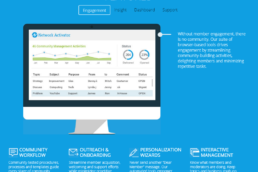 There are different reasons why people participate in online communities. Not one size of inspiration fits all online community members. People tend to respond better to appropriately designed reward stimulus. Simply put, if they get what they need online, they will be more likely to continue their participatory acts. And, as any seasoned community manager knows, without the active posters, the community is just a content shell. Post-less communities don”t serve the customer needs as well as an active community does, especially within the B2B world as engagement is a main measure of social business success. So, when designing scalable engagement programs it is critical to first typify the categories of membership into profiles or personas in order to encourage and reward them for their online visibility.
There are different reasons why people participate in online communities. Not one size of inspiration fits all online community members. People tend to respond better to appropriately designed reward stimulus. Simply put, if they get what they need online, they will be more likely to continue their participatory acts. And, as any seasoned community manager knows, without the active posters, the community is just a content shell. Post-less communities don”t serve the customer needs as well as an active community does, especially within the B2B world as engagement is a main measure of social business success. So, when designing scalable engagement programs it is critical to first typify the categories of membership into profiles or personas in order to encourage and reward them for their online visibility.
There are four primary types of online participators: Fame Seekers, Connectors, Problem Solvers and Influencers. Below I will describe each category – how to spot them and offer ways to keep them engaged.
Fame Seekers
These are the people who seek opportunities to grow reputation or a platform to showcase thought leadership. They are often the up-and-comers in a profession or discipline who are looking to grow their reputation among their peers. Most often found in niche B2B communities, they are the ones who like to show what they know – and often know a great deal about the subject matter at hand. Essential to growing an online community, the fame seekers represent about 40% of all active participators online.
The fame seeker is motivated by public recognition, appreciation & endorsements in the online environment. Some example rewards include a member spotlight article about them. Feature their photo and bio and interview them about the work they do. They also often appreciate an opportunity to submit a bylined article, and appreciate a shout-out in newsletter or in a discussion. This reinforce that they are on the right track in terms of the content or messages they contribute to the community. If they get the right guidance, they tend to repeat the fruit-bearing activities.
Connectors
The connector can be spotted as they are the ones who tend to connect people to each other, and people to ideas posted in the community. The first ones to call attention to a legacy discussion about a topic or they are often willing to provide a link to information that someone else is seeking- even if it means extra effort on their part. They are frequently found in support communities, and thrive on being a community conduit. The Connectors often have a large number of peer connections within the community and often serve the community through their quiet but powerful peer –referral activities. They represents about 30% of all community participators.
Because they are simply being helpful, off-line and online appreciation are equally valued. Their goal is to serve the profession or topic well, as serve as a powerful go-to person within the community. Consequently, they are also the most responsive to personal messages asking for help by the community manager as they are the most likely to answer your call for help. A hand written or emailed thank-you can do about as much to motivate these people as a public post to thank them.
Another way to show appreciation and also to deepen their connection–capabilities is to offer the Connector additional responsibility within the community. For example, they tend to make wonderful content curators or people matcher in service of the community through a well-organized volunteer program. Do remember, however, that online connectors are likely to play this role in the workplace as well and are often the busiest of professionals, so you need to have a well formed offer for them in order to get them more involved.
Problem-Solvers
The problem solver is often a community underdog – They are a reticent participant but overcome the fear of posting publicly in order to get answer to questions/ fill professional needs. They represent about 20% of all online community participation. They seek salient information and thought leadership to deepen their learning environment. The problem solver is not usually emotionally connected to the community like the Fame-Seeker or the Connector often is, so it is critical to capture these people’s attention early, for example, within their 2nd or 3rd login or post with answers to their puzzles in order to develop trust and a safe participation experience in order to entice them to continue participating over time.
In search of timely response and information, the community manager can make the problem-solvers experience with their online community meaningful by offering them timely response, the information they seek – even if it means sometimes doing additional research specifically for them. While time consuming for the manager, it is often worth the effort to serve these people well because if you are able to capture their attention, they often convert into active posters and more frequent participators.
Influencers
The fourth type of online participators are the influencers. These people have already achieved professional achievements and public recognition as their reputations are often well-known in a given industry. A rare find in a B2B online community, when the Influencer shows up publicly they often seek to assert their thought leadership position through industry insight and analysis. They are motivated by being the first to know, first to assert guidance and ideas. There is little use in fanning their egos as they do not seek or need a community manager’s praise, they tend to participate in a community because they have found some professional thought leadership within the walls of the community and find value in the exchanges they find online. While it is important to showcase them and lure them into participating over time, they must be approached with caution as they are accustomed to being in the spotlight so any attempts to engage them must be done with significant forethought and a valuable offer. A community manager can entreat these Influential posters by offering them early and ongoing access to information such as access to road maps, company summits, a thought leadership platform like a persistent blog feature on the site.
Successful online communities are built on engaging all types of participants and not just the ones that are first to the participation party. So, while it is tempting to focus on the members who are sure to respond to other members, be sure to offer a little something for everyone to get excited about!
Related Posts
July 10, 2018
How To Increase User Engagement in your Online Community
Every member goes through four stages of activity within an online community:…
December 15, 2015
Why Inclusive Marketing should be on Your Agenda for 2016
Your guide to doing inclusive marketing - the right way!
October 26, 2015
Online Community Managers: A Tool of Our Own!
For years, social media marketers have had tools like Hootsuite, Sprinklr, and…
7 Comments
Add comment Cancel reply
This site uses Akismet to reduce spam. Learn how your comment data is processed.



I liked so much your post. Regards.
Vanessa – I would add one category:
Head-Nodders / Rubber-Stampers
These folks want to be part of the community, but mainly contributed by agreeing or reinforcing what has already been added. In blogs/communities with 50+ comments per post, I ballpark close to half of the commenters are head-nodders.
Yep. That’s what I was going to say.
What about the inactive members? How to address them?
Howdy, There’s no doubt that your site may be having web browser compatibility problems.
Whenever I take a look at your blog in Safari, it looks fine however, if
opening in IE, it’s got some overlapping issues.
I just wanted to provide you with a quick heads up! Aside from
that, fantastic blog!
Thank you very much for taking the time to share that information. We will look into it pronto. thank you!
Vanessa
[…] don’t just message everyone. First engage these people. If they have answered a question, comment on their answer and provide more details to […]